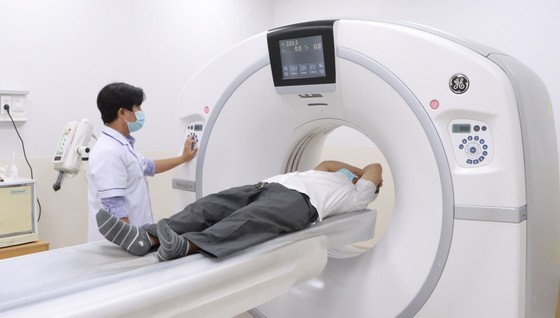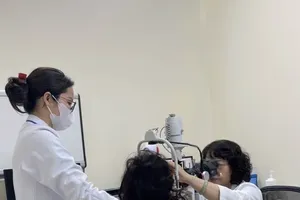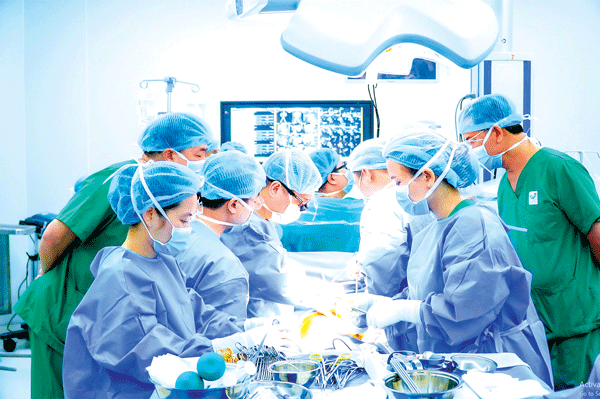 |
CT scan at Ho Chi Minh City Oncology Hospital |
The Ministry of Health has recently released Circular 22/2023/TT-BYT (Circular 22), which establishes standardized prices for health insurance-covered medical services across hospitals of similar grades nationwide. The circular also offers guidance on the application of these prices and the reimbursement of medical expenses in specific situations. Several healthcare services have seen price adjustments, aiming to boost revenue for hospitals through health insurance, ultimately enhancing the quality of patient care. Nevertheless, these changes have raised concerns among patients.
Price adjustments for numerous healthcare services
Truong Dung Hanh, residing in Thu Duc City, Ho Chi Minh City, incurred hospital fees of nearly VND 100,000,000 for her husband's leg surgery at Cho Ray Hospital following a workplace accident. Hanh mentioned that she had saved this sum of money over many years of working as a laborer, but it was only enough to cover the first payment. With each increase in healthcare service costs, her concerns mount. Previously, there was an increase in the prices of medications, and now it's the turn for hospital fees to rise. With each treatment session costing tens of millions of VND, she can only strive to afford the treatment as much as she can.
According to Deputy Minister of Health Nguyen Duc Luan, Circular 22 has been in effect since November 17, leading to increases in the prices of various healthcare services across hospitals of similar grades. Specifically, the medical examination fee at special-grade hospitals such as Cho Ray, Bach Mai, Viet Duc, and Hue Central has risen from VND38,700 per visit to VND42,100 per visit. Not only central-level hospitals but the medical examination fee at local commune health stations has also been raised from VND27,500 per visit to VND30,100 per visit.
Meanwhile, for Grade I hospitals, the examination fee per visit has risen from VND38,700 to VND42,100; Grade II hospitals have seen an increase from VND34,500 to VND37,500, and Grade III hospitals now charge VND30,100, up from VND27,500. Along with the adjustment of examination fees, the daily bed charges for treatment at healthcare facilities have also climbed as per the regulations outlined in Circular 22. Consequently, the price for emergency intensive care beds at special-grade hospitals is VND509,400 per day, up VND51,400; Grade I hospitals charge VND474,700 per day, an increase of VND47,700; Grade II hospitals are at VND359,200 per day, a rise of VND34,200, and the lowest bed charge at commune health stations is now at VND64,100 per day. For highly specialized fields such as organ transplantation, bone marrow transplantation, and stem cell transplantation, the bed charges for these specialties at special-grade hospitals now stand at VND867,500 per day, an increase of VND85,500.
As assessed by the Ministry of Health, the healthcare service prices covered by health insurance in Circular 22 are formulated based on both direct costs and salaries. Direct costs encompass clothing, hats, masks, bedding, electricity, water, and cleaning expenses, as well as the maintenance and upkeep costs of facilities and equipment. Salary costs include salaries based on job grades, allowances regulated by the State, permanent allowances, and surgical and procedural allowances determined by the Prime Minister. Therefore, with the adjusted health insurance-covered medical service fees (approximately a 10 percent increase) outlined in Circular 22, hospitals have an additional source of revenue from health insurance to enhance the quality of healthcare services to serve patients.
Essential: Improving service quality
While the prices of many healthcare services have been adjusted, the Ministry of Health representatives state that Circular 22 does not negatively impact groups covered by health insurance, such as underprivileged people, ethnic minorities, and social policy beneficiaries because these groups receive 100 percent coverage for their medical expenses from the health insurance fund. Individuals obligated to contribute 5-20 percent towards their health insurance-covered medical expenses are affected, but the additional amount is not substantial. They can afford the payment because their income increases following the base salary.
It was recorded that many hospitals promptly implemented the new healthcare service prices following the enactment of Circular 22. They also initiated measures to improve the quality of healthcare services by streamlining administrative procedures, reducing overload, and minimizing inconvenience for patients. The leaders of hospitals such as Cho Ray, Thong Nhat, and 115 said that Circular 22 is issued based on the adjusted base salary, which has increased from VND1.49 million to VND1.8 million since July 1, 2023. This represents a gradual adjustment of medical service prices towards more accurate and comprehensive calculations.
With Circular 22 in effect, there is now an additional revenue source from health insurance for healthcare facilities, extending from commune health stations to hospitals at various levels. This translates to increased funds and resources for investing in equipment, infrastructure, and specialized expertise. Hopefully, patients can access a broader range of high-tech services locally, contributing to the alleviation of the burden on higher-level medical facilities. Professor - Dr. Dao Xuan Co, Director of Bach Mai Hospital, suggests that despite the price increases for many health insurance-covered healthcare services, patients ultimately benefit. The adjustment of healthcare service prices in a more accurate and comprehensive direction will gradually ease the financial burden on patients, ensuring the rights of health insurance participants. Patients seeking medical attention are rightfully prioritized and positioned as the ones bearing the cost for services while the hospital serves as the service provider.
Circular 22 also brings adjustments to the prices of around 2,000 healthcare services. For instance, the cost for a standard ultrasound, as per the new regulations, is now VND49,300 per session (previously VND43,900). The highest-priced service is for intravascular ultrasound or measuring fractional flow reserve (FFR) in coronary arteries, now priced at VND2,023,000 per session (previously VND1,998,000). The standard X-ray fee is raised to VND53,200 per session from VND50,200, while the fee for a CT Scanner with 64 to 128 slices with contrast agent is adjusted to VND1,712,000 per session from VND1,701,000.
























